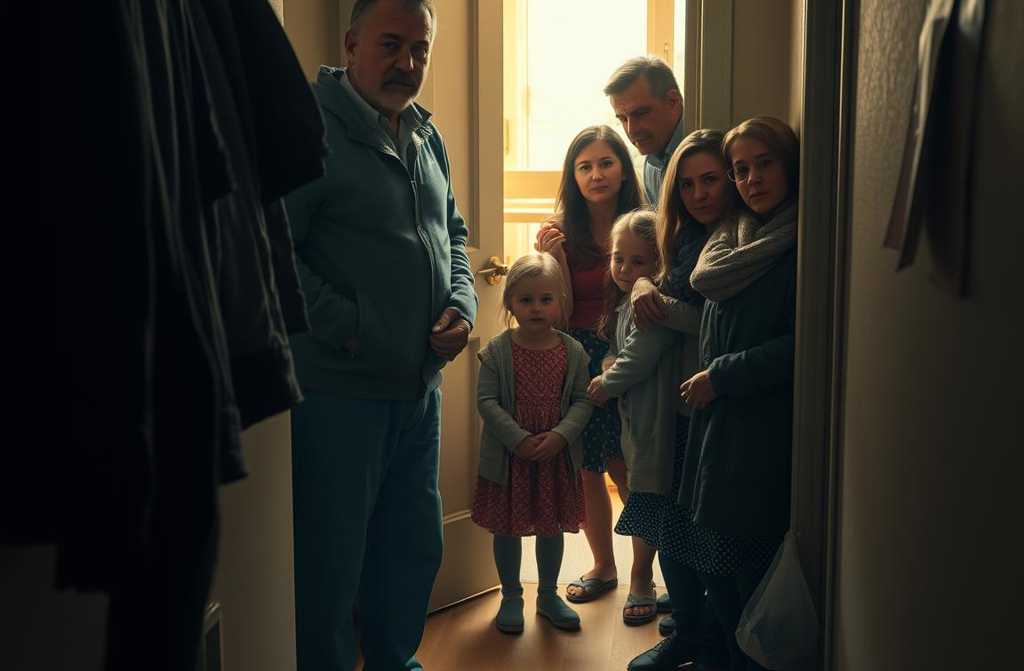З життя
Together in the Stairwell

**Diary Entry 10th April**
It was in Stairwell Six, where the air always carried the damp scent of raincoats and old concrete, that spring made itself felt most keenly. The evenings were still cool, but the light lingeredas if the day was reluctant to leave.
The Wilson family trudged homefather, mother, and their teenage soneach balancing bags of groceries, the green stalks of spring onions poking out the top. Drops of rainwater clung to the front door; someone had come in without shaking their umbrella properly.
Fresh notices were taped to doors and mailboxeswhite sheets printed from a home computer. Bold red letters declared: *”URGENT! Water meter replacement! Deadline this week! Penalties apply! Contact number below.”* The damp air had already warped the paper, blurring the ink in places. Downstairs, Mrs. Audrey stood by the lift, phone in one hand, a tote bag of potatoes in the other.
“They say therell be fines if we dont switch them,” she fretted as the Wilsons passed. “I rang the numbersome young man said its a special offer just for our building. Maybe we really ought to?”
Father shrugged. “Seems too sudden. No warning from the council, no letters. And ‘special offer’? Sounds fishy to me.”
Dinner conversation circled back to it. Their son pulled another flyer from his schoolbagidentical, folded in half and wedged in the doorframe. Mother turned it over, then checked their last water bill.
“Our meters were checked just last year. Why the rush? And whos even heard of this company?”
Father frowned. “We should ask the neighbours if theyve had these. And find out whos behind it.”
By the next day, the stairwell buzzed with chatter. Voices echoedsomeone upstairs argued on the phone, while two women by the rubbish chute swapped anxious whispers.
“They told me theyd cut the water off if we dont comply!” one huffed. “Ive got little ones!”
Then the doorbell rang. Two men in matching jackets and briefcases made their rounds. One clutched a tablet, the other a stack of forms.
“Good evening! Urgent water meter replacementspenalties apply for delays!” His voice was loud, polished, but unnervingly slick. His partner rapped on a neighbours door like he was racing the clock.
The Wilsons exchanged glances. Father peered through the peepholeno IDs, no uniforms. Mother whispered, “Dont answer. Let them move on.”
Their son edged to the window: a plain van idled below, the driver scrolling on his phone. Puddles shimmered under the streetlamps.
Minutes later, the men left wet shoeprints trailing down the hall.
By evening, the building hummed like a beehive. Some had booked appointments; others got vague replies from the council. The neighbourhood WhatsApp group debated: Were they legit? Why the pressure? The Wilsons decided to ask flat 17 upstairs.
“Their IDs looked dodgyjust laminated paper, no stamp,” their neighbour admitted. “When I asked for credentials, they bolted.”
Father proposed, “Tomorrow, well corner them for proper paperwork. Ill ring the council directly.” Mother agreed. Their son promised to record it.
Morning brought the “service men” backthree this time, same jackets, same urgency. Father cracked the door, chain still fastened.
“Show your credentials. Your licence. And the work order number from the council.”
The man fumbled, produced a generic-looking sheet. His partner avoided eye contact, thumbing his tablet.
“Were under contract for this building”
“With whom? Give me the council reps name and the job reference.”
Stammering about penalties, they wilted as Father called the council on speakerphone.
“Have you authorised meter replacements today? There are men going door-to-door”
The answer was crisp: no planned works, no such team dispatched. All legitimate contractors notify residents in writing beforehand.
The men backpedalledwrong address, mix-upbut Father had already recorded everything.
Dusk fell quickly. Wet footprints led to the rubbish chute; hushed voices seeped through doors. The Wilsons knew then: it was a scam. The solution was simplewarn the others, act together.
Father gathered Mrs. Audrey, the woman from flat 17, a few others. The landing smelled of raincoats and fresh bread. Their son replayed the recording.
“Council confirmed its a fraud,” Father said. “No fines, no shutdowns. These blokes are con artists.”
“I already booked an appointment!” a neighbour groaned, flushing.
“Youre not the only one,” Mother reassured. “But real contractors dont pressure you like this.”
Father rallied them: “No payments, no letting them in. Demand proof, call the council on the spot.” Their son listed red flagsreal inspections are scheduled, verifiable.
“Lets draft a complaint to the council,” Mother suggested. “And put up a notice downstairs.”
Neighbours nodded. Someone fetched a pen; another dug out paper. As they drafted the alert, the mood shiftednervousness gave way to purpose. Laughter even bubbled up.
“Next time, well meet for more than just dodgy salesmen,” Father joked.
By midnight, only forgotten umbrellas and a grocery bag remained.
Morning brought changes: the fake notices vanished. No “service men” returnedjust a crumpled flyer by the bins. Neighbours exchanged grateful smiles; Mrs. Audrey brought scones “for saving us from folly.”
The Wilsons counted the costtime spent, awkward confessions, lost trust in door-to-door pitches. But the stairwell felt different now: sharper eyes, closer bonds.
Victory wasnt just dodging a scam. It was learning to trust each other, not just the strangers at the door.
**Lesson:** A shared threat turns neighbours into allies. And a con artists best weapon? Our fear of being the only one fooled.

















